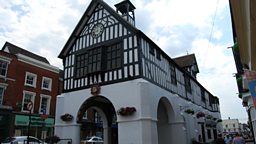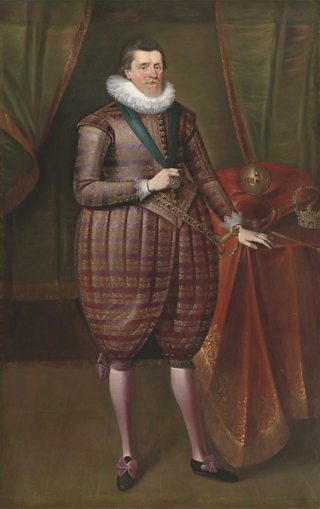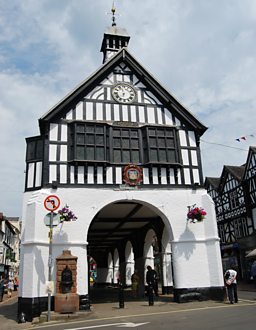Poverty stricken Bridgnorth ‘splashes the cash’ on Shakespeare’s royal players
Shakespeare’s newly-named band of players, The King's Men, performed in Bridgnorth in Shropshire sometime after May 1603 – a period when the town was down on its heels. Yet the good burghers of Bridgnorth still dug deep into the town’s meagre funds to pay the troupe of actors an unprecedented amount of money for their performance.
-
![]()
Much ado near me
Hear more Shakespeare stories on BBC Radio Shropshire
-
![]()
Shakespeare Festival 2016
The BBC celebrates the genius of the bard

At this time, King James had just arrived in the London court from Scotland to take up the throne. One of his first acts was to decree his King’s Men as the official royal troupe of actors.

Why would a town clearly suffering hard times pay so much?
The group quickly formed, and escaped the plague which was rife in London, in order to tour the provinces. Among the first places they performed was Bridgnorth.
Town records show that they were paid £2 for their performance – remarkable on several levels. The town was suffering the economic effects from a declining clothing trade and in the past had a policy of not using its money to pay for travelling players. The amount was also eye-watering when compared with the fees paid by many other towns in the country. Why would a town clearly suffering hard times pay so much?
The earliest recorded payment for players in Bridgnorth occurs in 1551-2. However, in 1570-1 (Shakespeare would be only 6 years old at this point) it was decreed by those in power - bailiffs and aldermen - “that no playars… shalbe receved upon the Townes chardges”, which doubtless reflects the town’s dire economic circumstances. However, scattered payments continued to occur.
In 1601-2, the town further decreed that no players would be permitted to use the Town Hall, but that players were to be free to play in their inns if they wished. This provides evidence that playing in private venues such as inns was not abnormal – here, as before, the town of Bridgnorth is simply trying to scrimp and save, not to ban nor inhibit playing.
This evidence of honest penury makes the more remarkable appearance of the King's Men at Bridgnorth sometime between 19th May 1603 and 2nd January 1604. Between these dates town records show a reference to “Item paied to the kinges players,” a sum involving £2.
Such an amount was unprecedented, not only for Bridgnorth, not only for Shropshire, but virtually everywhere. Only the large and prosperous city of Coventry matched that amount, and only on one occasion - the company’s first visit. Was the town of Bridgnorth being exceptionally generous? Or was the occasion of the visit of the King's Men something special in the town’s history?
In view of the arrival of the new King and the status of the King's Men – and on their first tour of the provinces to boot – this likely would have been the occasion for a Town Hall performance, with the bailiffs and aldermen as chief spectators. However, as with every record of performance in the provinces, the documents are maddeningly silent about which play might have been performed – although it is reasonable to assume that the King's Men would have travelled with the same plays from their normal repertory at the Globe Theatre in London.
Bridgnorth in Shakespeare's Day
The ‘north’ in this town’s name occurs because its bridge was one and a half miles north of an earlier bridge at Quatford, a very early low-lying borough whose fate was to be overshadowed by Bridgnorth.
It was likely the town could not afford the expenses – official rewards, breakage, wear and tear – that might be incurred if the town hall were to be usedAlan Somerset, REED
Robert de Bellême founded the town, building there a strong castle on a high promontory that commanded control of passage along the Severn River.
By the sixteenth century, writer John Leland indicated that Bridgnorth and Ludlow were about the same size (approximately 2500), but that Bridgnorth had suffered from economic decline of the clothing trade “that now decayed there, the towne sorely decayethe ther withe.”
This could well explain the town’s reluctance by the early 1600s to allow travelling players to perform in Bridgnorth’s Town Hall.
Alan Somerset, an academic from the Records of Early English Drama (REED) project writes: “It was likely the town could not afford the expenses – official rewards, breakage, wear and tear – that might be incurred if the town hall were to be used. Also, if a company played a short season…the council would be denied the use of their hall during that time”.
Instead, players would most likely have used one of the town’s Inns – charging admission on the door to gain income (as seen in our Ludlow story – when robbers preyed on the doorman).
However, an exception was clearly made when the new King’s official troupe of players visited Bridgnorth. They were given the red carpet treatment – handsomely paid, and most likely given the town hall for their performance.
Shakespeare on Tour
From the moment they were written through to the present day, Shakespeare’s plays have continued to enthral and inspire audiences. They’ve been performed in venues big and small – including inns, private houses and emerging provincial theatres.

BBC English Regions is building a digital picture which tracks some of the many iconic moments across the country as we follow the ‘explosion’ in the performance of The Bard’s plays, from his own lifetime to recent times.
Drawing on fascinating new research from Records of Early English Drama (REED), plus the British Library's extensive collection of playbills, as well as expertise from De Montfort University and the Arts and Humanities Research Council, Shakespeare on Tour is a unique timeline of iconic moments of those performances, starting with his own troupe of actors, to highlights from more recent times. Listen out for stories on Shakespeare’s legacy on your BBC Local Radio station from Monday 21 March, 2016.
You never know - you might find evidence of Shakespeare’s footsteps close to home…
Craig Henderson, BBC English Regions


-
![]()
Shakespeare Lives
The nation’s greatest performing arts institutions mark 400 years since the Bard's death
Related Links
Shakespeare on Tour: Around Shropshire
-
![]()
Drunken robbers threaten the leader of Shakespeare's players
As he collects admission money at the door!
-
![]()
A new king and rebranded Shakespeare’s players head first for Shrewsbury
James I established the ‘King’s Men’ as his official group of theatre players
-
![]()
Shakespeare… by gaslight!
An 1819 playbill invites people to enjoy the newly-installed gas lighting in the theatre
Shakespeare on Tour: Around the country
-
![]()
The 'Young Roscius' storms Manchester
Boy actor William Betty treads boards at ten
-
![]()
Will Kemp dances to Norwich
The journey of Shakespeare's former clown
-
![]()
Domestic Calamity postpones performance
Did the 'curse of Macbeth' strike?
-
![]()
Jonathan Miller and the Cambridge Footlights
Much ado about Jonathan Miller's Shakespeare










